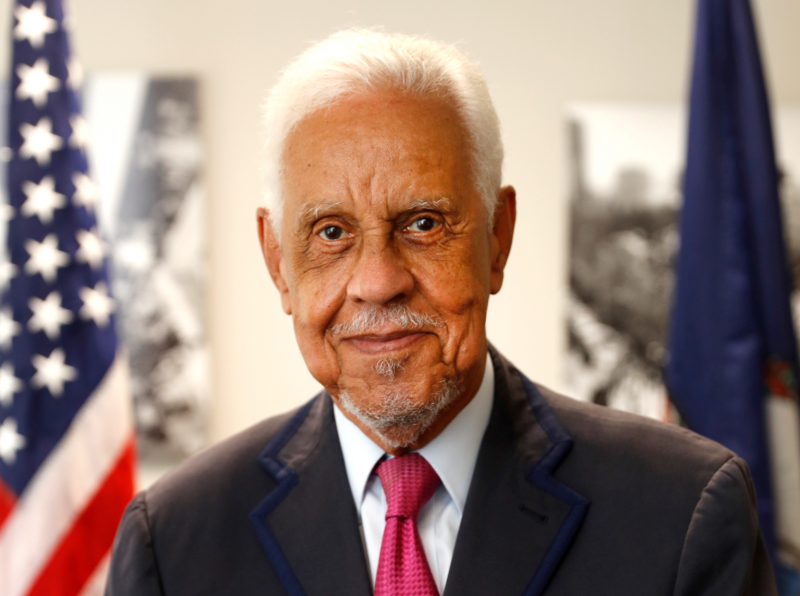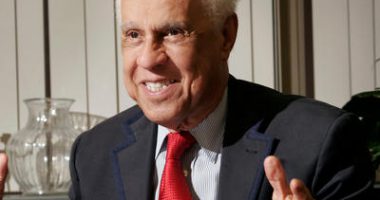For reasons heretofore given, I call upon Governor Northam to immediately remove and replace the leadership at VMI, including the Board of Visitors, or resign from office.
Is Virginia Military Institute doomed?
That’s probably an overstatement, but we’re not the ones who raised the question — the chair of the General Assembly’s Senate Finance Committee was and, since she’s got some control over the state’s budget, she’s the one who really counts.
Let’s back up and offer some context for that rather alarming question: A year in which Confederate statues have been coming down has not been an easy one for the Lexington school where until recently first-year cadets had to salute the statue of one of its former professors, Confederate Lt. Gen. Thomas “Stonewall” Jackson.
In June, Roanoke Times education writer Claire Mitzel wrote about how some Black alumni were using social media to describe what they had faced at VMI, including: “being punished for not saluting the Jackson statue; white cadets wearing blackface; the pain of charging across the New Market battlefield; white students using the N-word; getting spit in the face.” She followed up on the article in July with more details about alumni reaction to the issue. VMI itself responded to the alumni in July, saying it would alter traditions but would not take down statues, including the one of Jackson.
The Washington Post followed up with stories of its own in September and then again last weekend: “At VMI, Black cadets face pervasive racism, threats.” That prompted Gov. Ralph Northam to order an independent investigation. VMI pledged to cooperate, but the head of its governing board issued a statement declaring that “systemic racism does not exist here.”
That prompts two thoughts: First, why didn’t Northam act back in June when these charges first came to light? Instead, he let these pass for months. Richmond Times-Dispatch political columnist Jeff Schapiro writes that Northam acted “after taking telephone calls Sunday from Black legislative leaders, among them House Appropriations Committee Chairman Luke Torian of Prince William, alarmed by fresh reporting on the school’s racial culture.” Why weren’t they alarmed in June? Or is this evidence of what we’ve suspected all along — that the new leaders of the General Assembly really have no idea what’s happening west of the Blue Ridge?
Second, for VMI to declare that it is free of racism is to believe that VMI is a pristine bubble that is somehow immune to the faults of society at large. That beggars belief.
In any case, we now come to the key part. Schapiro reported on a September meeting where VMI Superintendent Binford Peay met with Janet Howell, the Fairfax County Democrat who chairs the Senate’s budget-writing committee: “Howell signaled to Peay that she is prepared to use VMI’s appropriation from the state — it currently receives $19 million a year — as a weapon to force change at the school.” But here’s what came next: “The senator, in an interview Tuesday, went further, wondering whether Virginia would be better off without VMI. ‘I’m not sure how important or relevant it is,’ said Howell. ‘It seems to me it’s time has passed, especially if it doesn’t adjust to changing times.’”
The budgetary threat is likely real; the question about “whether Virginia would be better off without VMI” is probably a bluff. But it’s also not a question that should be completely ignored. Schapiro, who understands the state’s political dynamics better than many politicians, noted that VMI “is having little luck with a Democratic regime dominated by the General Assembly’s Black caucus and white liberals, many from Northern Virginia.” Put another way, the political culture in Richmond has changed. If Howell — a legislative veteran — is asking whether Virginia really needs a state-supported military college, what might some of the newer and more liberal backbenchers think? VMI may not want to know, but it needs to.
What if the General Assembly really did decide it didn’t want VMI anymore? Mind you, we’re not advocating that outcome — it’s in the region’s economic interest to have as many colleges as possible — but just because a question is unpleasant doesn’t mean it should be ignored.
There are lots of small colleges that shut down every year — at least 64 since 2016, according to Education Dive. Those appear to be private colleges that encountered financial difficulties. We can’t find any recent historical examples of state-supported schools that have closed, although there are some in other states in the past.
If the state didn’t want VMI, could it go private? Yes, but … VMI is not an independent entity that can do its own thing. It’s a state asset. If, say, alumni wanted to operate VMI as a private school, they’d have to buy it from the state. Would the state even be interested in selling? If no, it’s a moot question — or a philosophical one. Would VMI still be VMI if it were someplace else? We have no way to estimate the value of the property, which is not simply on the National Register of Historic Places but a full-fledged National Historic Landmark District.
Even if Virginia gave away the property — don’t count on that — there’s the question of operating expenses. Virginia currently supplies about $19 million a year for operating expenses. Where would that come from? Yes, Sweet Briar College alumnae raised $21 million when they were trying to forestall the school’s closure five years ago— and have since averaged $12.6 million a year. VMI is a bigger school and has more alumni, but it would have to raise enough to replace that state funding each year. True, VMI does have a far bigger endowment than Sweet Briar did. The VMI Foundation shows net assets at nearly $478 million. However, many of those assets are restricted for specific uses. Financial documents show the income last year on the unrestricted assets was $8.9 million. Whatever the math, VMI alumni would have to raise a lot of money to make their alma mater work as a private school.
VMI officials looked at “going private” three decades ago when they were facing legal challenges to being all-male. Then-Superintendent John Knapp said in 1990 “the chances are not good.” He added: “I’m not saying we couldn’t run our school as a private institution. I’m saying there are two grave reasons: One is the sheer economics, and the other is this amalgam of questions about having historically been a state institution, service to the commonwealth, their property, their investment, their opportunity to be a willing seller.” Has any of that changed? Does Howell’s comment suggest it has?
Stay tuned.







